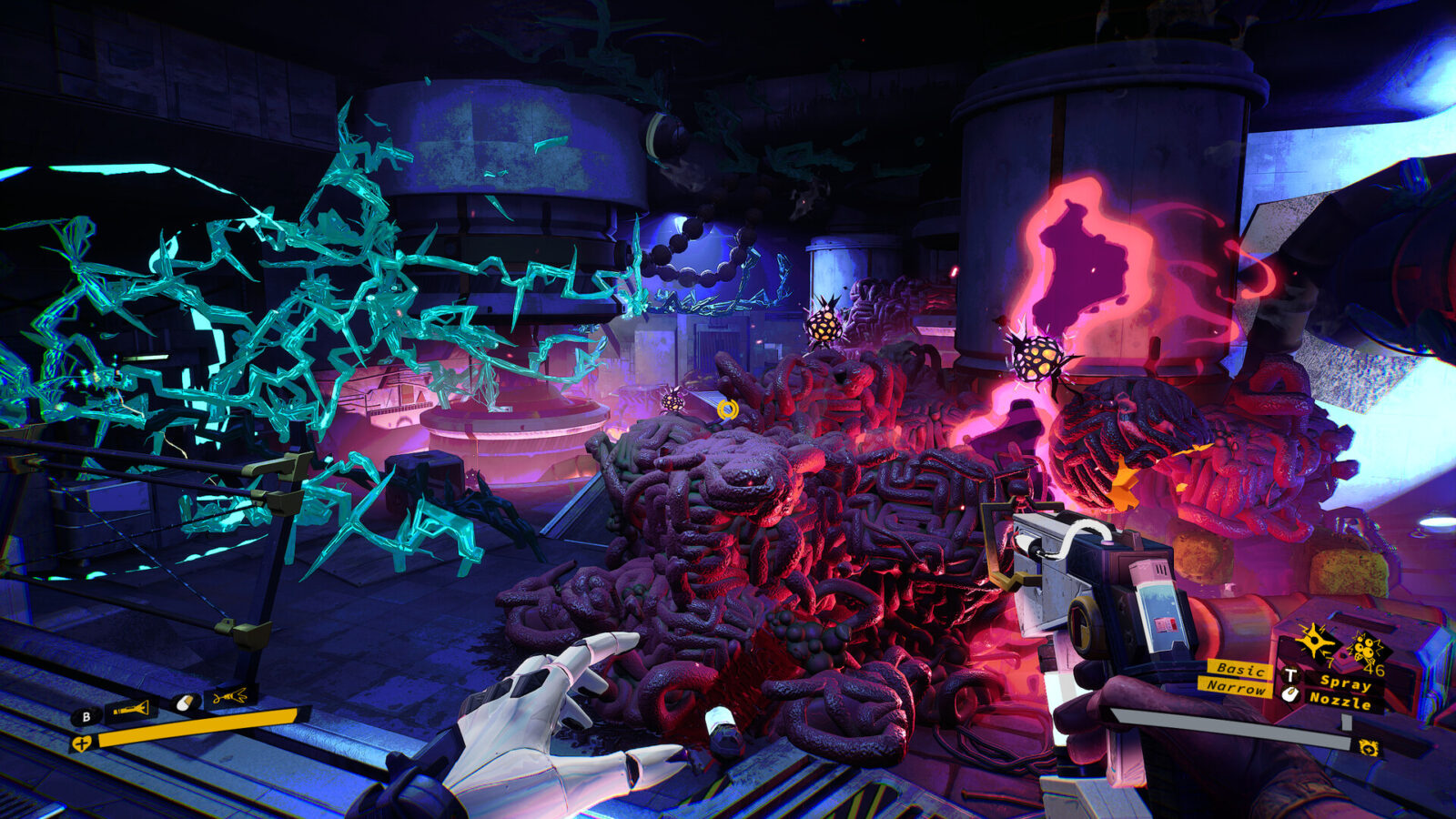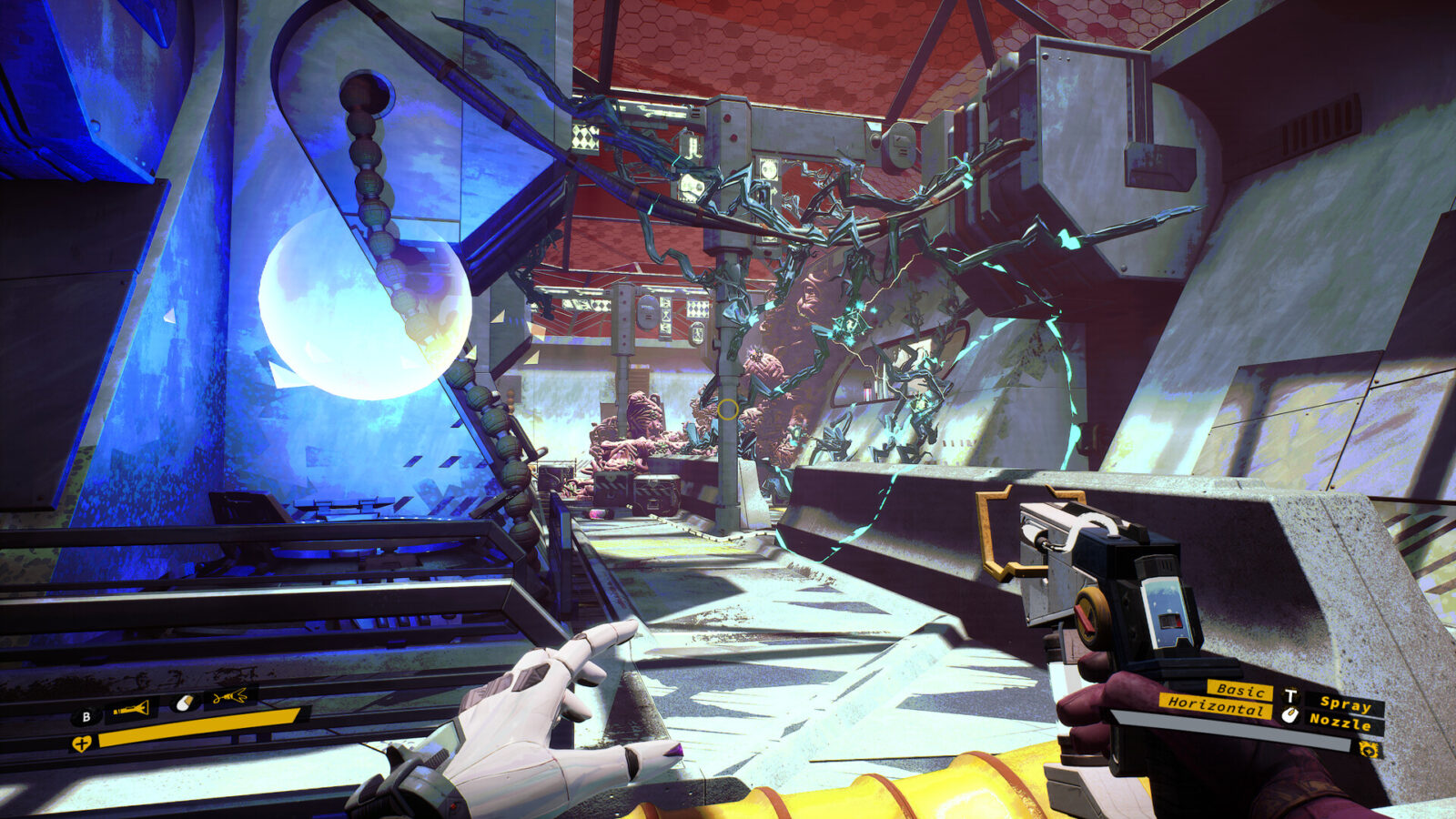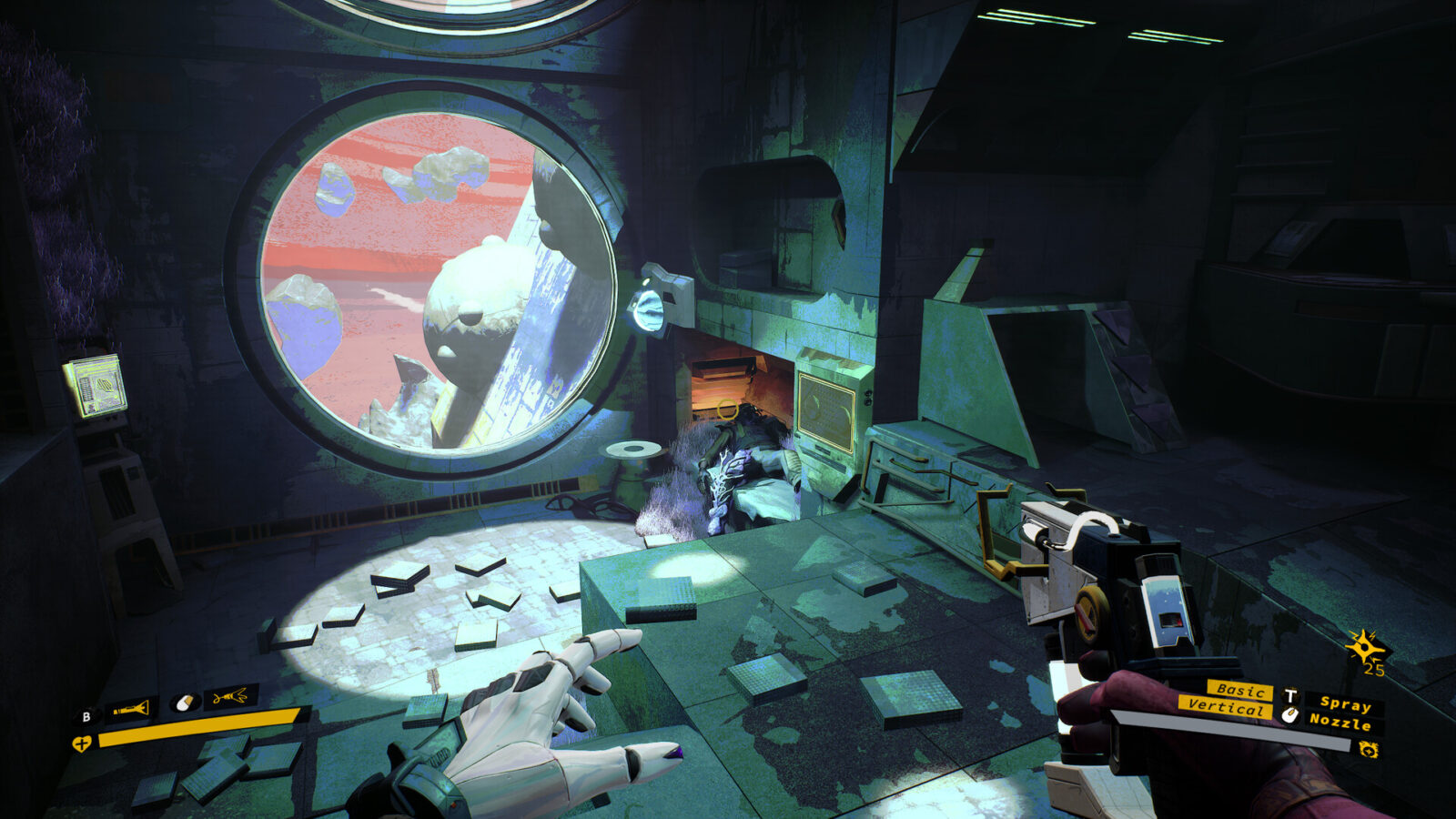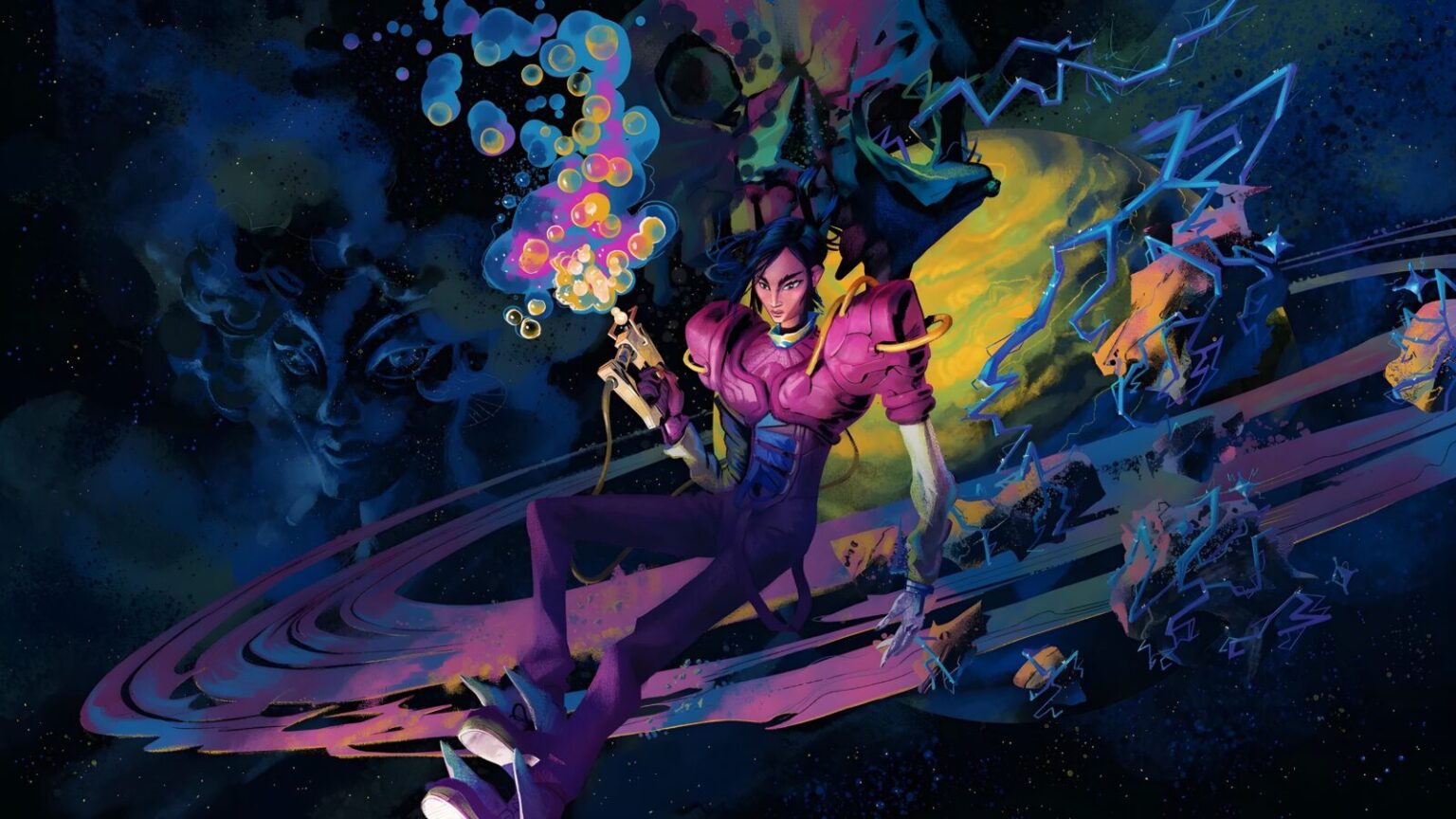TL;DR: A contemplative, atmospheric space-cleaning adventure anchored by loss, memory, and one of the gentlest depictions of death in gaming. Unfinished, yes—but absolutely worth stepping into.
Ambrosia Sky: Act One
Ambrosia Sky: Act One is the kind of game that feels like it must have started as a late-night Discord joke. Someone, somewhere, must have said: “Okay, picture this. Metroid Prime, but you’re basically the universe’s most emotionally exhausted janitor.” And instead of fading into the digital ether like most absurd pitches do, the idea crystallized into this unexpectedly tender sci-fi meditation on death, memory, and the extremely unglamorous realities of being the only person still doing their job while the cosmos collapses around you.
It’s the tone that hits first. Before you even understand the rules of the place—this abandoned asteroid colony drifting in Saturn’s rings like a forgotten promise—you feel the quiet. Not the sterile quiet of typical sci-fi stations, but the heavy quiet of somewhere that used to be full. Somewhere that once had birthday parties, office gossip, someone who left dirty dishes in the lab sink on purpose just to irritate a colleague. Ambrosia Sky doesn’t bombard you with exposition; it lets the emptiness speak first.

Dalia, the protagonist, is a Scarab—part field biologist, part spiritual custodian, part spacefaring mortician with a sprayer holster and more emotional baggage than the original crew of the Nostromo. She’s returning home, but “home” is now a fungal mausoleum, pulsing with purple growths that look unsettlingly like organs that have developed opinions about you. The game never lets you forget that this is her birthplace. Every hallway feels like she’s walking through a wound that never fully healed.
The cleaning mechanic is, oddly enough, the emotional anchor of the entire thing. Your chemical sprayer feels like a glorified pressure washer that wandered onto the set of Annihilation, and the simple act of blasting away the alien fungus is both deeply satisfying and thematically loaded. It’s catharsis with a trigger pull. You’re not just tidying up; you’re excavating stories, reclaiming space, making room for grief to breathe.
There’s an almost reverent pace to the way you clear each room. Spraying away a thick knot of fungal roots reveals a forgotten workstation. Cleaning the underside of a railing uncovers a broken charm bracelet. Scrubbing a sealed doorway until it finally hisses open feels like convincing a locked memory to let you in. And off in the static hum of the colony, you hear Dalia remembering… something. Someone. Too many someones.
That’s where Ambrosia Sky becomes quietly devastating.
Because the colony isn’t empty. It’s full of the dead—people who didn’t leave during the evacuation, or couldn’t, or chose not to. And every time you find one, you don’t just catalog them like an investigator. You learn them. You sit with them. You gather pieces of their lives through notes and recordings and the scattered detritus of who they were before everything went fungal and terminal.

And then the game delivers its most heartbreaking touch: each corpse has left a final message. Not a confession. Not a dramatic dying declaration. A message for Dalia. Something gentle. Something grateful. Something meant to make her job easier, even as their final moments were anything but.
It’s a strange kind of hope the game cultivates. Grim, but not cynical. Somber, but not cruel. These people knew a Scarab would come for them, and instead of fear, what they felt was comfort. It reframes death not as a failure, but as a transition—one that demands respect, patience, and tenderness.
Dalia kneels before them. She performs her rites. And the game makes you sit in that moment, not to glorify it, but to acknowledge the weight of it. The whole experience becomes a kind of ritual cleansing, both literal and emotional.
Of course, this is just Act One, and the narrative doesn’t even pretend to resolve itself. Threads involving cult activity, corporate malpractice, and Dalia’s family history all start weaving into something larger, but the game stops before the tapestry reveals its image. The story ends right when it’s beginning to accelerate, like someone paused the show just before the big reveal to remind you that Season Two isn’t out until next year. It’s not disappointing—it’s just unfinished, and very aware of it.

The gameplay progression suffers a similar fate. You gain upgrades quickly, but most of them boil down to “more juice in the sprayer.” The electric spray, which has the potential to unlock interesting environmental interactions, is mostly relegated to opening a few optional doors. The game markets itself as an immersive sim, but Act One feels more like a guided tour through a beautifully rendered graveyard. Linear, intentional, but not particularly complex.
And yet… it works. The linearity doesn’t clash with the tone; it shapes it. You’re not here to solve a puzzle-box spaceship full of systemic interactions. You’re here to witness, to clean, to care, and to follow Dalia through the emotional minefield of returning to the place she once fled.
The art direction does a lot of the heavy lifting. Ambrosia Sky’s painterly, impressionistic style gives the fungus an almost mythic quality, like biological brushstrokes scrawled across forgotten architecture. The colony has the soft, intimate lighting of a place that was lived in but never sanitized for public consumption. Every corridor feels alive—or recently alive.

Even the gameplay loop, while simple, taps into that strange brand of cleaning-sim serenity that somehow makes scrubbing a fictional alien infestation feel emotionally restorative. There’s something deeply therapeutic about it, and the game knows this. It leans into the meditation of it all, the slow reveal, the tiny stories behind every stain and shutdown system.
By the time Act One ends, you’ve only cleaned a fraction of the colony. You’ve only touched the surface of Dalia’s past. And the fungus—both literal and metaphorical—feels like it’s still spreading. But the game leaves you with an unmistakable feeling: you want to come back. Not out of obligation, but out of a strange affection for the dead, the living memory of the place, and the woman caught in between.
Soft Rains may not have delivered a complete experience yet, but they’ve delivered something that matters: a tone, a world, and a character worth following into the dark.
Final Verdict
Ambrosia Sky: Act One is a beautiful, sorrow-soaked sci-fi experience that mixes meditative cleaning mechanics with a compassionate exploration of death and memory. It’s incomplete and mechanically limited, but its emotional center is already powerful, and its atmosphere lingers long after the credits. If Act Two fulfills the potential this first chapter promises, Ambrosia Sky could become one of the most quietly affecting sci-fi stories in recent memory.







